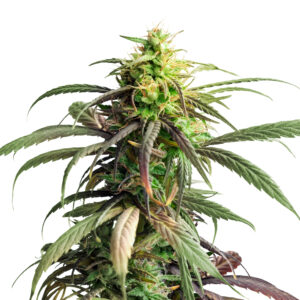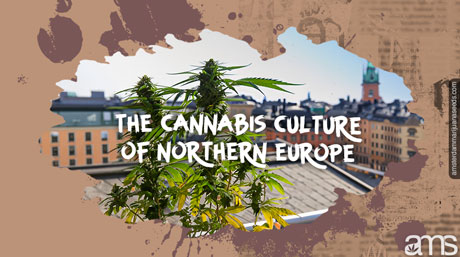Over the past several years, Western Europe has been in the throes of a significant shift in societal and governmental attitudes towards cannabis. This shift, primarily driven by increasing recognition of the medical potential of cannabis, has transformed the conversation around the plant from a mere counterculture debate to a mainstream dialogue.
The change in perspective is mirrored in the legislation, economic potentials, and healthcare discussions now happening across Western Europe. It’s not just about opening the door to a new recreational pastime, but about harnessing the therapeutic potential of a plant that has long been stigmatized and misunderstood. More governments are considering and enacting laws that permit the medical use of cannabis, realizing the positive impact it can have on the lives of those suffering from chronic and debilitating conditions.
This liberalization in attitudes has also stimulated a new wave of investment, research, and entrepreneurship. The cannabis industry, from cultivation to retail, is blooming across the region, creating jobs and boosting local economies. In the healthcare sector, research into cannabinoids – the active compounds in cannabis – is helping to uncover new treatment options for a myriad of diseases. The Western European shift towards accepting medical cannabis is just the beginning of a complex and exciting journey, one that promises profound implications for politics, economy, healthcare, and society at large.

The United Kingdom, as one of Western Europe’s economic powerhouses, took a notable step in 2018, when it legalized medical cannabis. This move towards embracing the therapeutic potentials of cannabis came in response to significant public and political pressure, fueled by high-profile cases of children with epilepsy who were unable to access potentially life-saving cannabis-based treatments.
One of the leading global figures in the arena of cannabinoid-based medicine development, GW Pharmaceuticals, has its base in the UK. Their groundbreaking work resulted in the development of Epidiolex, a CBD-based medicine, marking a significant milestone in modern medicine as the first drug of its kind to be approved by the U.S. Food and Drug Administration. This approval signified a shift in the recognition of cannabis-derived substances as legitimate therapeutic agents for certain types of epilepsy, which historically have been challenging to treat.
Despite these promising developments, the prescription of medical cannabis in the UK remains a complex and contentious issue. The National Health Service (NHS), a publicly-funded healthcare system that serves as the primary healthcare provider for UK citizens, exercises stringent control over cannabis prescriptions. According to NHS guidelines, cannabis-derived medicines are considered a ‘last-resort’ treatment, to be used only when standard treatment options have been unsuccessful.
This policy, coupled with the reluctance of some doctors to prescribe cannabis-based treatments due to insufficient clinical trial data and a lack of comprehensive education on cannabinoid therapeutics, has limited the accessibility of medical cannabis. As a result, an atmosphere of potential yet unrealized growth in the market has formed. Patients who could potentially benefit from medical cannabis are left navigating a difficult system, often turning to private healthcare providers or exploring the largely unregulated CBD market.
While the UK has taken significant steps in legalising and acknowledging the therapeutic benefits of cannabis, the journey towards widespread acceptance and use of these treatments is far from complete. Moving forward, the UK’s challenge lies not only in persuading clinicians and healthcare professionals about the potential benefits of medical cannabis but also in implementing a clear, efficient, and patient-friendly system for prescription and distribution. The ongoing dialogue surrounding cannabis in the UK is a testament to a society in transition, grappling with the evolving understanding of this ancient plant in a modern medical context.

Germany, known for its strong economy and emphasis on scientific research, has emerged as a leading force in the European medical cannabis market. The country legalized medical cannabis in 2017, opening the door to new possibilities in healthcare and sparking a wave of innovation and investment in the industry.
Since legalization, the medical cannabis market in Germany has experienced significant growth. Physicians are now able to prescribe cannabis-based treatments for various conditions, including chronic pain, multiple sclerosis, chemotherapy-induced nausea, and other symptoms associated with serious illnesses. This expanded access to medical cannabis has provided relief to many patients who had previously exhausted traditional treatment options.
Germany’s approach to medical cannabis is founded on research and evidence-based policy. The government has prioritized rigorous scientific studies to better understand the therapeutic potential of cannabis and ensure the safety and efficacy of its medical applications. This commitment to evidence-based medicine has positioned Germany as a leader in shaping regulations and standards for the medical cannabis industry.
Berlin, the capital city of Germany, has emerged as a vibrant hub for cannabis-related activities. The city is home to numerous cannabis startups, research institutions, and patient advocacy groups. These organizations are at the forefront of groundbreaking research, exploring the potential of cannabis as a treatment option for various medical conditions. The presence of these entities in Berlin fosters collaboration, knowledge exchange, and innovation, further propelling Germany’s position as a frontrunner in the medical cannabis field.

Cologne, another prominent city in Germany, has also embraced the potential of cannabis in healthcare. The city is known for hosting international conferences and trade fairs focused on medical cannabis, attracting industry professionals, researchers, and stakeholders from around the world. These events serve as platforms for sharing the latest advancements in medical cannabis research, discussing regulatory frameworks, and fostering collaborations that drive the industry forward.
Germany’s inclusive and patient-centric approach to medical cannabis has resulted in a broad acceptance of its therapeutic benefits. The country has established a well-regulated system for cultivation, production, and distribution of medical cannabis products, ensuring quality and safety standards are met. Pharmacies across the nation dispense medical cannabis to patients, providing access to those who require it.
Furthermore, Germany’s public health insurance system covers the cost of medical cannabis for eligible patients, making it more accessible and affordable. This progressive approach recognizes the potential of cannabis to improve patients’ quality of life and acknowledges the need to provide equitable access to medical treatments.
As Germany continues to embrace the potential of cannabis in healthcare, its robust research infrastructure, evidence-based policies, and commitment to patient welfare set an example for other nations. The country’s success in integrating medical cannabis into mainstream healthcare demonstrates the transformative impact that a well-regulated and scientifically informed approach can have on patients’ lives.
While challenges and areas for improvement still exist, Germany’s dedication to advancing medical cannabis research, promoting innovation, and ensuring patient access places it at the forefront of the medical cannabis movement in Western Europe and beyond.

The Netherlands, particularly its capital Amsterdam, has long been associated with a progressive and tolerant approach to cannabis. Since the 1970s, the country has been at the forefront of cannabis acceptance, with a unique policy that separates the legal sale and consumption of cannabis in coffee shops from the general prohibition of recreational use. This approach has made the Netherlands an iconic symbol of cannabis tolerance worldwide.
While recreational cannabis use is technically illegal in the Netherlands, it is effectively decriminalized. Under the “gedoogbeleid” (tolerance policy), the possession and consumption of small quantities of cannabis for personal use are not actively pursued or prosecuted by law enforcement. This policy has created a distinctive environment where residents and tourists alike can openly purchase and enjoy cannabis in licensed coffee shops.
However, it is important to note that the Netherlands has gone beyond recreational tolerance and recognized the medical potential of marijuana. In 2003, the country officially legalized the medical use of cannabis, acknowledging its therapeutic benefits for patients with specific conditions. The Dutch government established the Office of Medical Cannabis to regulate the production, quality control, and distribution of medical cannabis.
Through the Office of Medical Cannabis, the Netherlands operates a well-established medical cannabis program. It supplies a variety of cannabis strains to patients both within the country and internationally, ensuring regulated and quality-controlled access to medical cannabis products. Patients with specific medical conditions, such as chronic pain, multiple sclerosis, and certain forms of epilepsy, can benefit from the therapeutic potential of cannabis through the program.
This focus on providing medical cannabis to patients reflects the Netherlands’ commitment to evidence-based medicine and patient welfare. The government continues to support scientific research on the medical applications of cannabis, facilitating advancements in understanding the plant’s potential and optimizing treatment options for patients.
Moreover, the Netherlands has become a global leader in cannabis research and policy-making. Renowned scientific institutions and research organizations in the country conduct groundbreaking studies on the therapeutic properties of cannabis and its various compounds. This research contributes to a deeper understanding of how cannabis can be utilized in medical settings and informs future developments in the field.
The Netherlands’ journey from cannabis tolerance to recognizing its medical benefits demonstrates a nuanced and progressive approach to the plant. By embracing both recreational tolerance and medical access, the country has fostered a unique environment that encourages dialogue, research, and responsible use of cannabis. The Dutch model has inspired other nations to consider alternative approaches to cannabis regulation and explore its therapeutic potential for the well-being of patients worldwide.

France, known for its rich cultural heritage, is experiencing a gradual evolution in its attitudes towards cannabis. While recreational cannabis use remains illegal, the country has taken notable steps towards exploring the medical potential of the plant and embracing CBD, a non-psychoactive compound derived from cannabis.
In 2020, the French government initiated a significant medical cannabis trial, marking a significant shift in its previously stringent policy. The two-year pilot program aims to provide medical cannabis to 3,000 patients suffering from conditions that have not responded to conventional therapies. This trial reflects a growing recognition of the potential benefits that cannabis-based treatments can offer to individuals in need.
While the medical cannabis program is still in its early stages, the emergence of CBD in the French market is a notable development. CBD, which does not induce psychoactive effects, has gained popularity for its potential therapeutic properties. Paris, the cultural hub of France, has witnessed the rise of numerous CBD cafes and stores. These establishments cater to the growing curiosity and acceptance of CBD among the French population. CBD products, ranging from oils and tinctures to edibles and topicals, have become increasingly accessible to consumers seeking potential relief from various ailments.
The acceptance of CBD in France is partly driven by a shift in public perception and increasing awareness of its potential benefits. CBD has gained recognition for its alleged properties, including anti-inflammatory, analgesic, and anxiolytic effects. While scientific research on CBD is still evolving, anecdotal evidence and personal testimonials have fueled the interest and acceptance of CBD products among French consumers.
However, it is important to note that the regulatory landscape for cannabis, including CBD, in France remains complex. The French authorities maintain strict control over the use and sale of cannabis products, including CBD, and companies must adhere to specific regulations to ensure compliance. As the demand for CBD grows, there is a push for clearer guidelines and regulations to ensure consumer safety and product quality.
The evolving perspective on cannabis in France reflects a broader global trend of exploring alternative approaches to traditional medicine and embracing the potential of plant-based therapies. As the medical cannabis trial progresses and public acceptance of CBD continues to grow, France may witness further shifts in its policies and regulations regarding cannabis. The ongoing dialogue surrounding cannabis in France is a testament to the changing attitudes and a recognition of the need to explore new avenues for healthcare and well-being.

Spain has forged its own path in cannabis regulation, offering a distinctive approach through the establishment of “cannabis social clubs.” These private clubs, particularly prevalent in cities like Barcelona, operate as collective spaces where members can cultivate, share, and consume cannabis within a regulated environment.
While the sale of cannabis remains illegal in Spain, the cannabis social clubs provide a legal framework for cannabis consumption and distribution. These clubs operate within certain limits, with memberships and quantities strictly regulated to maintain a non-commercial and non-profit nature. The aim is to provide a safer and more controlled environment for cannabis use, reducing the risks associated with the black market and promoting responsible consumption.
It is important to note that, currently, Spain does not officially recognize medical cannabis as a treatment option. The prescription of medical cannabis is not supported by the national health system, which means patients do not have access to cannabis-based treatments through conventional channels. However, this does not negate the significant research and scientific advancements taking place in the country.
Spain boasts a thriving cannabis research sector, with dedicated scientists and researchers making substantial contributions to understanding the therapeutic potential of cannabis. Dr. Manuel Guzman, a renowned figure in the field, is among the scientists spearheading groundbreaking studies on the medical applications of cannabis. Their work focuses on exploring the effects of cannabinoids, the active compounds in cannabis, on various diseases and conditions, including cancer, epilepsy, and neurodegenerative disorders. The findings of these studies contribute to the growing body of evidence supporting the potential therapeutic benefits of cannabis-based treatments.
While Spain’s approach to cannabis regulation may be considered unconventional, it has created an environment that fosters research, innovation, and a responsible culture around cannabis consumption. The cannabis social clubs offer an alternative model, allowing individuals to access cannabis within a regulated framework while reducing the associated risks. However, there is an ongoing discussion about the need to address the legal gray areas surrounding cannabis in Spain, particularly regarding medical cannabis recognition and access.
As Spain continues to navigate this uncharted territory, it presents an intriguing case study for other countries exploring different approaches to cannabis regulation. The commitment to scientific research and the unique social club model demonstrate Spain’s willingness to challenge conventional norms and explore the potential benefits of cannabis in a responsible manner.

The surge of interest in CBD (cannabidiol) products across Western Europe has been nothing short of remarkable. CBD, a non-psychoactive compound found in cannabis, has gained popularity due to its potential therapeutic properties and versatility in various applications. Consumers are drawn to CBD for its purported benefits, including pain relief, anxiety reduction, and potential anti-inflammatory effects. As a result, CBD products have flooded the market in many Western European countries.
Regulations regarding CBD vary across Western Europe, but generally, CBD products can be legally sold as long as they contain less than 0.2% THC (tetrahydrocannabinol), the psychoactive compound in cannabis. However, it is crucial to note that regulations surrounding CBD are constantly evolving, and it is essential for consumers and businesses to stay informed about the specific laws in their respective countries.
Each Western European country has its own set of regulations and requirements for CBD products. Some countries, such as the United Kingdom and Germany, have established relatively clear frameworks for the sale and distribution of CBD. In contrast, others have more stringent regulations or are still in the process of formulating comprehensive guidelines. It is advisable for individuals and businesses operating in the CBD industry to navigate the evolving regulatory landscape with caution and adhere to applicable laws to ensure compliance and consumer safety.
In terms of cannabis politics, the increasing acceptance of cannabis, particularly for medical use, has paved the way for progressive policy reforms in Western Europe. As more scientific evidence emerges regarding the therapeutic potential of cannabis, governments are beginning to recognize the need to provide access to medical cannabis for patients in need. However, the journey towards comprehensive and harmonized cannabis regulation is complex.
Legislations regarding cannabis vary greatly among Western European countries, creating a patchwork of laws that can be challenging to navigate. Some countries, such as the Netherlands and Germany, have established comprehensive medical cannabis programs and regulations. Others are still in the early stages of exploring the medical applications of cannabis and formulating appropriate frameworks. The lack of uniformity in regulations across borders poses obstacles for patients, researchers, and businesses operating in the cannabis industry.
Harmonization of cannabis laws across the European Union (EU) has been a topic of discussion and holds the potential to streamline the industry and facilitate its growth. A unified approach to cannabis regulation within the EU could ensure consistent standards, improve patient access, and foster cross-border cooperation in research and development. However, achieving such harmonization is a complex task, requiring careful consideration of diverse cultural, political, and legal contexts across member states.
The growing trend of medical cannabis in Western Europe reflects a shifting culture, politics, and understanding of the cannabis plant. The focus has shifted towards recognizing and harnessing its therapeutic potential while ensuring appropriate regulation to guarantee patient safety. As research continues to expand our knowledge of cannabis, its compounds, and their potential applications, the industry’s future development is poised for fascinating advancements.
In conclusion, Western Europe is experiencing a transformative period in its relationship with cannabis. The acceptance and exploration of medical cannabis, along with the remarkable rise of CBD products, demonstrate a growing recognition of the plant’s potential in healthcare and wellness. While regulatory challenges persist, ongoing research, evolving policies, and potential harmonization efforts offer promising prospects for the future of the cannabis industry in Western Europe.













Related Posts

The widespread acceptance of cannabis, coupled with its increasing legalization for medicinal and recreational use, has sparked an interest in home cultivation, especially in the vast and varied landscapes of Eastern Europe.

In the realm of medical research and politics, the cold, scenic landscapes of Northern Europe are heating up with debates around the growing trend of medical marijuana usage. From the cultivation of the cannabis plant to the use of CBD in health and wellness, this region is demonstrating a shift in societal and political perceptions that are impacting local cultures and beyond.

The landscape of cannabis in Central Europe is as diverse and dynamic as the region itself. Rich in history and culture, Central Europe, a region predominantly comprising the countries of Germany, Austria, Hungary, Poland, Czech Republic, Slovakia, and Slovenia, is currently undergoing a significant shift in its perspective towards this age-old plant. Each of these countries carries its unique narrative…